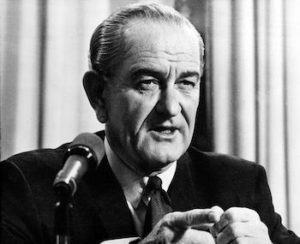
Lyndon Baines Jonson
*Lyndon Johnson was born on this date in 1908. Often referred to by his initials LBJ, he was a white-American politician and former teacher.
Lyndon Baines Johnson was born in a farmhouse in Stonewall, Texas, the oldest of Samuel Ealy Johnson Jr. and Rebekah Baines Johnson's five children. The Johnson family, known for farming and ranching, settled in Texas before the American Civil War, founding the nearby town of Johnson City in its aftermath. Lyndon's father, a Texas congressman, proved better at politics than ranching, encountering financial difficulties before losing the family farm when his son was in his early teens.
He struggled in school but graduated from Johnson City High School in 1924. He enrolled at Southwest Texas State Teachers College (now Texas State University) and participated in debates and campus politics. After graduating in 1930, he briefly taught high school and worked as a congressional aide before winning the election to the House of Representatives in 1937.
He won election to the Senate in 1948 and was appointed Senate Majority Whip in 1951. He became the Senate Minority Leader in 1953 and the Senate Majority Leader in 1955. He became known for his domineering personality and the "Johnson treatment," his aggressive coercion of powerful politicians to advance his legislative agenda. Lyndon Johnson said the word “nigger” a lot; his intersectionality with Blacks as a white Southerner was prevalent throughout his career. In Senate cloakrooms and staff meetings, Johnson was practically a connoisseur of the word.
According to Johnson's biographer Robert Caro, “Master of the Senate: The Years of Lyndon B. Johnson,” 2002. Johnson would calibrate his pronunciations by region, using “nigra” with some southern legislators and “Negra” with others. Discussing American Civil Rights legislation with men like Mississippi Democrat James Eastland, who committed most of his life defending white supremacy, he’d simply call it “the nigger bill.”
Johnson ran for the Democratic nomination in the 1960 presidential election. Although unsuccessful, he accepted the invitation of then-Senator John F. Kennedy of Massachusetts to be his running mate. They went on to win a close election over the Republican ticket of Richard Nixon and Henry Cabot Lodge Jr. On November 22, 1963, Kennedy was assassinated, and Johnson succeeded him as President. The following year, Johnson defeated Senator Barry Goldwater of Arizona. With 61.1 percent of the popular vote, the largest share of the popular vote of any candidate since the largely uncontested 1820 election. He served as the 36th President of the United States from 1963 to 1969. Formerly the 37th Vice President of the United States from 1961 to 1963.
A Democrat from Texas, Johnson also served as a United States Representative and the Majority Leader in the United States Senate. Johnson is one of only four people who have served in all four federal elected positions. In domestic policy, Johnson designed the "Great Society" legislation to expand civil rights, public broadcasting, Medicare, Medicaid, education aid, the arts, urban and rural development, public services, and his "War on Poverty."
During his administration, assisted partly by a growing economy, the War on Poverty helped millions of Americans rise above the poverty line. Civil rights bills that he signed into law banned racial discrimination in public facilities, interstate commerce, the workplace, and housing; the Voting Rights Act prohibited specific requirements in southern states used to disenfranchise African Americans. With the passage of the Immigration and Nationality Act of 1965, the country's immigration system underwent reform, encouraging greater emigration from regions outside of Europe. Johnson's presidency marked the peak of modern liberalism after the New Deal era.
In foreign policy, Johnson escalated American involvement in the Vietnam War. In 1964, Congress passed the Gulf of Tonkin Resolution, which granted President Johnson the authority to use military force in Southeast Asia without requiring an official declaration of war. The number of American military personnel in Vietnam increased dramatically, from 16,000 advisors in non-combat roles in 1963 to 525,000 in 1967, many in combat roles. American casualties soared, and the peace process stagnated. Growing unease with the war stimulated a large, angry anti-war movement based chiefly among draft-age students on university campuses.
In August 1965, Johnson signed the Voting Rights Act, which guaranteed Blacks the right to vote. The bill made it illegal to impose restrictions on federal, state, and local elections designed to deny blacks the vote. Johnson faced further troubles when summer riots began in major cities in 1965, and crime rates soared as his opponents raised demands for "law and order" policies. While Johnson began his presidency with widespread approval, support for him declined as the public became frustrated with the war and the growing violence at home.
On June 13, 1967, President Johnson appointed Thurgood Marshall to the Supreme Court following the retirement of Justice Tom C. Clark, saying that this was "the right thing to do, the right time to do it, the right man and the right place." In his book, Flawed Giant, Johnson's biographer Robert Dallek wrote that Johnson explained his decision to nominate Thurgood Marshall to the Supreme Court rather than a less famous black judge by saying, “When I appoint a nigger to the bench, I want everybody to know he’s a nigger.”
In 1968, the Democratic Party factionalized as anti-war elements denounced Johnson; he ended his bid for re-nomination after a disappointing finish in the New Hampshire primary. Richard Nixon was elected to succeed him as the New Deal coalition that had dominated presidential politics for 36 years began to collapse. After he left office in January 1969, Johnson returned to his Texas ranch; his last public speech at the University of Texas, Austin, is worth viewing. It shows the intersectionality of his soul's cognitive dissonance regarding race, personally and professionally. Lyndon Baines Johnson died of a heart attack at age 64 on January 22, 1973.